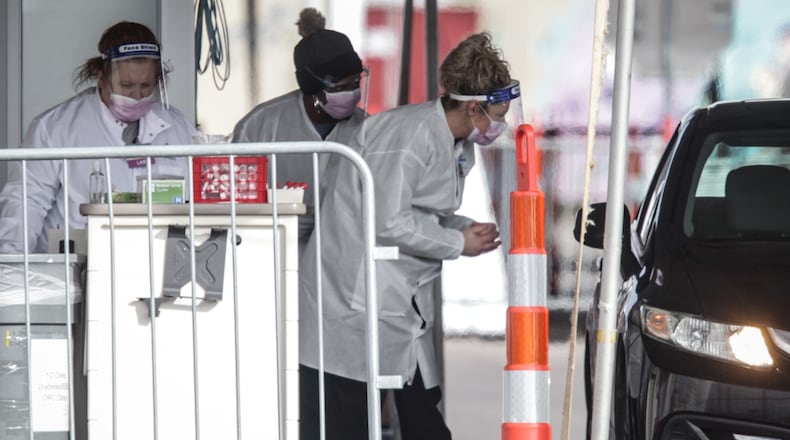Patients who receive the antigen tests, sometimes called rapid tests, get results from the hospital in four hours or less. The quick results can help speed up isolation of contagious individuals and contact tracing, in the hopes of slowing the spread of the virus in the community.
“The need for faster, easier tests is only growing with the pandemic. At the same time, antigen testing has improved tremendously in accuracy over the last few months,” the hospital stated. “While the PCR test will always be the gold standard, the antigen test Dayton Children’s has is right in positive cases 100% of the time and accurate in negative cases 97.5% of the time in symptomatic patients.”
Those results from the new version of tests from BD Veritor are more accurate than the rapid flu tests, according to Dayton Children’s.
Melanie Wilson, senior director of medical imaging and lab at Dayton Children’s, said in a statement that you should consider getting a rapid test 1 to 5 days after the onset of symptoms. She said the accuracy is no different between children or adult.
“The child may not have as many symptoms, but if they have a viral load it will be detected. One could argue that because this test is less invasive, children tolerate collection better,” Wilson said.
Dayton Children’s still has the PCR test for COVID-19, as well. Each test has different pros and cons.
The PCR (polymerase chain reaction) test is a nose swab that is sent to a lab to be analyzed. The lab technique looks for the virus’s genetic material. It is a more sensitive test, which means it can find and detect the virus at more times during an infection. It could take several days — sometimes more, sometimes less — to get the results, the time frame depends on a particular lab’s capacity and current demand.
The antigen test uses a nasal swab that looks for certain proteins on the virus’ surface. It has very accurate results for positive tests. Past the sixth day of symptoms, the test has a harder time finding evidence of the virus.
Dr. Glen Solomon, professor and chairman of internal medicine and neurology at Wright State University, said with rapid tests, people should be aware that they work best for people with symptoms who want to know if they have the disease. They aren’t great for people who feel fine and want an answer on whether or not they could be unknowingly carrying the virus.
“As we get into the holidays when people are getting advice to get tested before family outings ... these rapid tests are not very good for that,” Solomon said.
For the antigen test, people can visit Dayton Children’s three drive-thru sites, which are at:
- 884 Valley St., Dayton, in a tent in between main campus and Child Health Pavilion;
- 3300 W. Tech Road, Springboro, in the building across the street from the south campus;
- 865 W. Market St., Troy, in a tent behind the Troy outpatient care center.
See childrensdayton.org/covidtesting for hours. With a doctor’s order, insurance normally covers the cost though people without a provider order can pay $60 out-of-pocket. People who give a cellphone number get a text with results in four hours or less, and the person’s provider will also get the result if the provider ordered the test.
“Testing is an important step in knowing the spread of the virus in our community and containing that spread. We are grateful for Dayton Children’s and all our region’s hospitals for making testing and rapid results available to our region,” said Lisa Henderson, VP of health initiatives at the Greater Dayton Area Hospital Association.
Which test to choose
Your primary care provider can help you decide whether to get tested and which test is the right one for you.
Antigen test is best if you:
· Have symptoms for five days or less
· Need fast results
· Prefer a less invasive swab
The PCR test is best if you:
· Have symptoms longer than six days
· Need to confirm results of a previous test
· Need “the gold standard” of accuracy
Source: Dayton Children’s Hospital
About the Author

